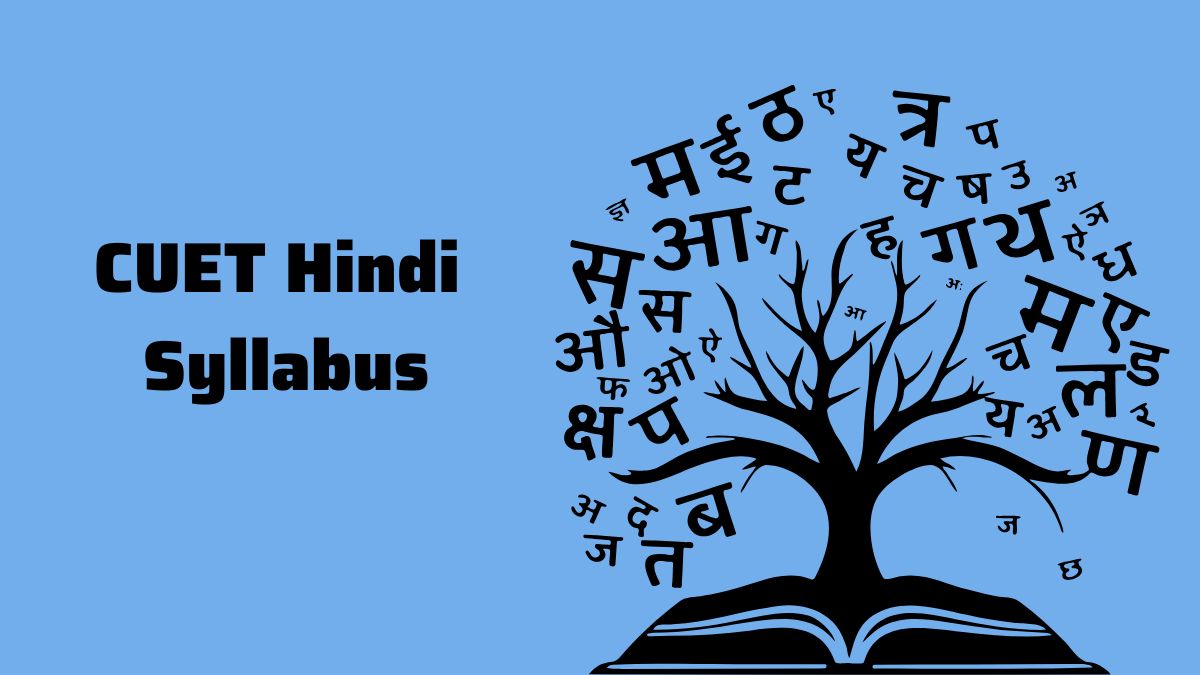Students aspiring to pursue undergraduate courses like BA Hindi, BA Hindi (Hons.), BA Hindi Journalism, BA Hindi Patrakarita, or B.Ed. Hindi in top universities such as Delhi University, Banaras Hindu University, Jawaharlal Nehru University, and others accepting CUET scores should first thoroughly understand the CUET Hindi syllabus. This syllabus covers all key topics essential for the exam.
To boost their preparation, students should also refer to CUET UG previous years question papers, as they provide valuable insights into the exam pattern and important topics. A strong grasp of the syllabus and regular practice with past papers can significantly improve their chances of success! The CUET UG Hindi exam is an entrance test for students who want to study Hindi at the undergraduate level in various universities. It tests the student’s knowledge of Hindi language, grammar, and literature.
CUET Hindi Syllabus 2026
The CUET 2026 Hindi syllabus will likely include Reading Comprehension, Grammar (including synonyms, antonyms, and proverbs), and Literature (works of famous writers) to test language proficiency and literary understanding. While the official syllabus isn’t out, it’s expected to be similar to previous years and based on Class 12 NCERT curriculum. Key components are factual, narrative, and literary comprehension passages, vocabulary, and an understanding of classic Hindi authors.
The CUET UG Hindi exam focuses on grammar and literature, including works by famous authors like Premchand and Harivansh Rai Bachchan. Students need to know Hindi grammar rules and understand the stories and poems written by these authors. To do well, it’s important to study both grammar and literature equally. Reading their work carefully and practicing grammar will help them achieve good marks in the exam.
- Comprehension passages may include factual, narrative, and literary types (usually 3-4 questions).
- Proverbs and sayings (लोकक्तियां).
- Antonyms (विलोमार्थी शब्द) and synonyms (पर्यायवाची शब्द).
- Other questions can be asked based on the works of renowned writers and poets.
CUET Hindi Exam Pattern 2026
The National Testing Agency (NTA) will conduct the CUET Exam 2026. The latest CUET Hindi Exam Pattern has been released to help students prepare better. It shows the types of questions, marking schemes, and sections included in the exam. By following this pattern, students can plan their studies and understand what to expect in the exam. Knowing the exam pattern helps in managing time and focusing on important topics. This makes preparation easier and improves performance. Check the table below for the detailed CUET Hindi Exam Pattern 2026.
| CUET Hindi Exam Pattern 2026 | |
| Particular | Details |
| Section | Section IA (Hindi) |
| Total Questions | 50 |
| Questions Need to Attempted | 40 |
| Duration | 45 minutes |
Preparation Strategy for CUET Hindi Exam
To prepare well for the CUET Hindi exam, students should first understand the syllabus and exam pattern. Focus on improving grammar, reading comprehension, and writing skills. Practice previous year papers to understand the question format and improve time management. Regular revision is key to success. The detailed strategy has been shared below to help students prepare better.
- Understand the Syllabus and Exam Pattern: Familiarize yourself with the topics covered, including grammar, literature, and comprehension. Understand the weightage given to different sections like objective-type questions, passages, and literary topics.
- Strengthen Grammar Skills: Revise important grammar topics such as Sandhi, Samas, Muhavare, and Shabd Shuddhi. Practice exercises regularly to ensure a strong foundation in language rules.
- Read Hindi Literature: Focus on significant works from Hindi literature included in the syllabus. Study poems, short stories, and essays by renowned authors like Premchand, Harivansh Rai Bachchan, and Mahadevi Verma.
- Practice Previous Year Papers: Solve previous year question papers to get familiar with the question format and difficulty level. This helps improve time management and builds confidence.
- Focus on Vocabulary and Comprehension: Regularly read Hindi newspapers, magazines, and books to improve your vocabulary. Practice comprehension passages to enhance reading speed and understanding.
Best Books for CUET Hindi Preparation 2026
All the aspirants who are looking to appear for the CUET Hindi Exam 2026 must start preparing for the exam by using some of the best books as listed below:
|
Best Books for CUET Hindi Preparation 2026
|
|
| Book for Hindi CUET Syllabus |
Author/Publisher
|
| Arihant NTA CUET (UG) Tests Section I (A) Languages (Hindi & English) | ArihantExperts |
| Go To Guide for CUET Hindi Language | Disha Experts |
| Hindi Sahitya Ka Saral Itihaas |
Vishwanath Tripathi
|
| Hindi Sahitya Ka Itihas |
Dr.Nagendra, Dr. Harday
|



 Best CUET Coaching in Delhi - Factors De...
Best CUET Coaching in Delhi - Factors De...
 Best CUET Coaching in Noida - Get Top 5 ...
Best CUET Coaching in Noida - Get Top 5 ...
 CUET PG Previous Year Question Papers wi...
CUET PG Previous Year Question Papers wi...







